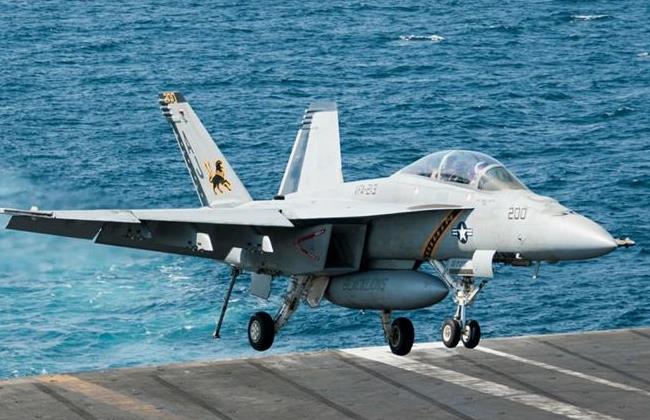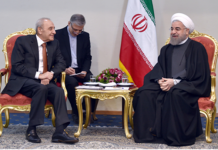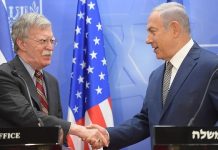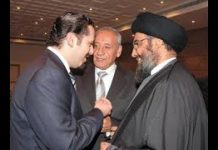It is Time for an Arab Strategy
Eyad Abu Shakra/Al Arabiya
Saturday, 28 Feb, 2015
Several facts these days give the impression that the Arab world has no clear vision as to where it stands in the unfolding Middle East developments. Most Arab countries seem as if they are unable to respond rationally to these developments which now endanger their national unity, if not their very existence.
To give some examples: Yemen has over the last couple of months undergone a number of pretty dangerous changes, including the fall of its capital to Iran-backed Houthi rebels, the flight of the legitimate “leadership” to Aden—the former capital of South Yemen—followed by several Arab embassies. This has been taking place against the background of major Iranian military and naval manoeuvres in the Arabian Gulf, Gulf of Oman and the Arabian Sea.
There is also some talk of Arab attempts to scale down the current tension with Turkey, while some Arab players continue to escalate their war of words with Ankara, accusing it of aiding and abetting extremist “Islamist” groups in Libya. The Islamic State of Iraq and Syria (ISIS) is maintaining its carnage and destruction in eastern Syria and western Iraq. Lebanon remains tense, worried and unable to elect a new president as its acute political impasse enters its tenth month. Then, the Israeli–Iranian competition to win America’s preferential position in the region is also hotting up.
All this is happening in a climate of acute confessional and sectarian agitation across the Arab lands, sometimes even taking bizarre forms devoid of any logical, moral or humane deterrence.
However, in spite of these painful realities, and the catastrophes that may result from them, one sees no Arab strategic approach. This surely cannot be said about Israel, Iran and Turkey, each of which has its own clear regional strategy.
The Israeli strategy, especially under the leadership of Benjamin Netanyahu, needs no introduction. Netanyahu, his Likud “hawks” as well as other extreme right-wingers have never believed in the “Land for Peace” principle, even when they were confronting a moderate secular Palestinian side ready to negotiate and accept the “Two States Solution”. Today, however, the Israeli extreme right is facing Palestinian groups that include “Islamist” organizations who are not only opposed to the “Two States Solution” but are also directly connected to Iran. Washington under Barack Obama is also committed to normalization leading to de facto alliance with Tehran, which has pushed Netanyahu and his allies, as the Israeli elections loom, to engage in an unprecedented battle of wills and blackmail with the American arena.
Here, it is important to remember that at the same time that Israel and Iran compete for a place closer to Washington’s ears and interests, the Arabs are in a lose–lose situation. If Obama wins this battle then the real victor will be Iran. While if the pro-Netanyahu Republicans in the US Congress emerge victorious their victory will be nothing more than a victory for the hard-line Israeli right-wing.
As far as Iran’s strategy is concerned, it has never been clearer than it is today. It is now obvious who has been preventing the emergence of a truly sovereign and united post-Saddam Iraq, particularly during the long term of former prime minister Nuri Al-Maliki. Iran’s hegemony over Iraq can now be seen not only in the methodical sectarian cleansing in several areas of Iraq, but also in the active combat role that has been entrusted to the Tehran-led Iraqi sectarian militias inside Syria. What is ironic is that these militias, as well as the Iraqi regular armed forces—built by Tehran and Washington—are mostly sitting out the continuing battles against ISIS, leaving this task to the Sunni Arab tribes of western Iraq. All the while, Iran is presenting itself to the West as being its main ally in the fight against extremist terrorism.
The reality is that Iran through Hezbollah—its Lebanese military and political wing—is preventing the election of any new Lebanese president that does not agree to carry out the Lebanese side of its regional strategy. Hezbollah is effectively an occupying force in Lebanon but what Iran is seeking is rather an occupation made “constitutional” through a “puppet” president. Almost the same thing can be said about Yemen where the pro-Iran Shi’ite Houthi rebels are expanding their occupation of the country southwards, threatening the provinces of Ma’rib, oil-rich Shabwah, and Abyan. The escape of the current president Abd Rabbuh Mansur Hadi from the occupied capital Sana’a to his southern stronghold of Aden has been the only Houthi setback since they began their onslaught, and since the dubious role of former president Ali Abdullah Saleh became apparent.
In both the Lebanese and Yemeni cases Iran is justifying its direct intervention by claiming it is fighting against “takfirist” jihadists and “Al-Qaeda” respectively. However, Lebanon does not look like it will be able to keep its independence as long as it is dominated by an armed confessional force that is much stronger than the Lebanese state. As for Yemen, it is unlikely to be able to maintain its national unity without containing the Houthi threat before it hands Iran control of the strait of Bab El-Mandeb.
Now, what about Turkey?
I dare say that Turkey’s knee jerk reaction against the July 2013 change in Egypt, which ended the short reign of the Muslim Brotherhood, was both immature and unwise. Still, the necessary regional balance in the Middle East should make it increasingly clear that Turkey can provide the counterweight to Iran’s creeping hegemony. In fact, whatever some may say about the Erdoğan regime’s sponsorship of the forces of “Sunni Political Islam” in the Arab world, the alternatives for Arab countries worried about Iran’s threat are diminishing by the day.
There is no doubt that the Middle East needs Egypt to play an active role, which thanks to its demographic, strategic and cultural weight, can and should provide the much needed balance. However, Egypt’s priorities at this moment in time are mainly domestic, not regional.
Thus, despite the welter of accusations leveled against Ankara, including even its “support” for ISIS and other extremist groups extending from Iraq to Libya, it is now a must that some sort of deep understanding with Ankara is reached without reservations. Indeed, what brings Turkey and many Arab countries together is much more important than temporary sensitivities and misunderstandings. It is vital that Turkey should now actively help to save what can still be saved of both Syria and Iraq, where tentative partition maps are all but ready.
It is now the right time to adopt a realistic and rational Arab approach that evolves into a true political “strategy” without delusions and ill-advised gambles.
بانتظار ولادة «المشروع العربي» في الشرق الأوسط
اياد بوشقرا/الشرق الأوسط/27 شباط/15
ثمة حقائق هذه الأيام لا توحي، مع الأسف، بأننا كعالم عربي، لديه رؤية واضحة لوضعه الإقليمي. فمعظم دولنا تبدو عاجزة عن بَلورة تصوّر حصيف في تعاملها مع المستجدّات المحيطة بها، التي توشك أن تهدد بقاءها أو – على الأقل – وحدتها الوطنية.
على سبيل المثال لا الحصر، شهد اليمن خلال العامين الأخيرين تحوّلات خطيرة. وأدّت سيطرة الحوثيين الملتزمين بـ«المشروع الإيراني» الإقليمي على العاصمة صنعاء إلى انتقال القيادة «الشرعية»، ثم عدد من السفارات العربية، من صنعاء «المحتلة» إلى عدن، وجاءت الخطوة الأخيرة بالتزامن مع المناورات البحرية الإيرانية الكبيرة في الخليج العربي وخليج عُمان وبحر العرب.
وهناك أيضا كلام عن مَساعٍ تُبذَل على المستوى العربي لتبريد الأجواء مع تركيا، بينما تصعّد جهات عربية نبرتها ضد دور تركي مزعوم في دعم الجماعات المتطرّفة في ليبيا. وعربدة دموية يمارسها تنظيم «داعش» في شرق سوريا وغرب العراق، وسط انهيار فعلي لمقوّمات الدولة في البلدين المتجاورين. وانسداد سياسي كامل ومخاوف أمنية في لبنان الذي يعيش منذ تسعة أشهر من دون رئيس جمهورية منتخب. وتنافس إسرائيلي – إيراني ساخن على تفويض واشنطن الإقليمي. وكل هذا.. وسط تأجيج مذهبي وطائفي على امتداد المنطقة العربية يأخذ أحيانا صورا عبثية في تفلّتها من أي منطق أو رادع أو وازع أخلاقي أو إنساني.
إزاء كل هذه الحقائق المؤلمة لا وجود لمقاربة عربية استراتيجية واحدة رغم المخاطر الهائلة التي يمكن أن تنجم عن ذلك، ولا سيما أن لدى كل من إسرائيل وإيران وتركيا «مشروعها» الخاص. باختصار، حتى الآن لا وجود لـ«مشروع عربي».
إسرائيل في عهد بنيامين نتنياهو مشروعها معروف. ونتنياهو و«صقور» الليكود وأحزاب اليمين المتطرّف الأخرى ما كانوا أصلا مؤمنين بـ«مبدأ الأرض مقابل السلام»، حتى عندما كان يواجههم في الجانب الفلسطيني المقابل قوى علمانية مقتنعة بالتفاوض، وموافقة على حل «الدولتين». أما اليوم، فإن اليمين الإسرائيلي المتطرّف يواجه قوى فلسطينية تمثل «الإسلام السياسي» تتحفّظ عن «حل الدولتين»، وبعضها مرتبط ارتباطا مباشرا بطهران. ثم إن أجواء واشنطن في عهد باراك أوباما أجواء تطبيع وتحالف مع إيران، وهو ما دفع نتنياهو وحلفاءه عشية الانتخابات الإسرائيلية إلى تصعيد ابتزازي فتح معركة غير مسبوقة داخل الساحة السياسية الأميركية.
إزاء هذا التنافس الإسرائيلي الإيراني على الحظوة الأميركية في الشرق الأوسط، ليس لدى العرب أي مجال للربح، لأن انتصار أوباما سيسجل لصالح طهران، وانتصار قيادة الكونغرس الجمهورية سيكون لصالح غلاة «الليكود» وحلفائهم.
البعد الخطير الثاني يتعلق بمشروع إيران الذي سقطت عنه آخر أوراق التوت. فالمصاعب التي تعترض قيام دولة عراقية «واحدة موحّدة» في حقبة ما بعد صدّام حسين انكشفت حلقاتها، حلقة تلو أخرى، وبالأخصّ إبان مرحلة حكم نوري المالكي المذهبي الصريح. واليوم، تنعكس هيمنة طهران ليس فقط في التطهير المذهبي الممنهج في مناطق عدة من العراق، بل يؤكدها الدور النشط للميليشيات الطائفية العراقية المأمورة إيرانيًا في سوريا، مقابل إحجامها عن التصدّي لـ«داعش» في الغرب السنّي. والمفارقة هنا أن إخفاق الجيش العراقي – الذي بنته طهران وواشنطن – في التصدي لـ«داعش» وتركه المهمة للعشائر السنّية في محافظات غرب العراق.. يأتي بينما «تسوّق» القيادة الإيرانية «خدماتها» أمام الغرب في مجال محاربة الإرهاب!
وواقع الحال، أن الابتزاز الإيراني ممثلا بحزب الله ما زال يمنع انتخاب رئيس للبنان، حيث الهيمنة الميدانية الفعلية للحزب، والسبب أن طهران تريد اليوم «شرعنة» هيمنتها على البلد دستوريًا عبر انتخاب «رئيس دمية» يحقق الشقّ الموكل للبنان من مشروعها الإقليمي. والشيء نفسه تقريبا ينطبق على اليمن، حيث يتمدّد الحوثيون جنوبًا ويهدّدون محافظات مأرب وشبوة وأبين، مع ملاحظة أن انتقال «السلطة الشرعية» ممثلة بالرئيس عبد ربه منصور هادي إلى عدن تشكل، ولو مؤقتا، أول نكسة للتمدد الحوثي منذ انكشاف الدور الخفي للرئيس السابق علي عبد الله صالح، ومن ثم احتلال الحوثيين صنعاء.
في الحالتين اللبنانية واليمنية، حيث تسوّق إيران تدخلها السافر تارة بالتصدي لـ«التكفيريين»، وطورا بقتال «القاعدة».. لا يبدو لبنان قادرا على حماية استقلاله في ظل بقائه تحت سطوة قوة مذهبية مسلحة أقوى من الدولة، ولا اليمن قادرا على حماية وحدته من دون إعادة «المارد الحوثي» إلى القمقم قبل تسليمه باب المندب لإيران.
ونصل إلى تركيا..
أزعم أن رد الفعل التركي من تغيير يونيو (حزيران) في مصر كان نزقا وقصير النظر، ولا يليق بقوة إقليمية كبرى كتركيا. غير أن التوازن الاستراتيجي يفرض وسيفرض تركيا أكثر فأكثر كقوة موازية وموازنة لإيران. ومهما كانت تحفظات البعض عن تبنّي «أنقرة إردوغان» لقوى الإسلام السياسي السنّي في المشرق العربي، فإن الخيارات تضيق يوما بعد يوم أمام الدول العربية المعنية مباشرة بالتهديد الإيراني.
وهنا، لا بد من الإقرار بأن المنطقة بحاجة إلى دور فعّال تلعبه مصر بحكم ثقلها السكاني والاستراتيجي والثقافي.. يحقق الحد الأدنى من التوازن، غير أن أولويات مصر الضاغطة في هذه المرحلة أولويات محلية أكثر منها إقليمية.
وبالتالي، بصرف النظر عن تسابق منتقدي أنقرة على اتهامها بدعم «داعش» وغيره من التنظيمات المتطرّفة، من العراق إلى ليبيا، غدا من الواجب التوصل إلى تفاهم بالعمق مع أنقرة من دون مواربة، ولا سيما أن لكل من تركيا وعدة دول عربية مشرقية اليوم مصالح مشتركة أكبر بكثير من الحساسيات العابرة.
بكلام أوضح، فإن عودة تركيا للعب دور فعّال ينقذ ما تبقى من سوريا والعراق، حيث تبدو خرائط التقسيم شبه جاهزة، أمر أكثر من حيوي.
المطلوب اليوم مقاربة عربية عاقلة وواقعية تنتهي بـ«مشروع» حقيقي.. بعيد عن الرهانات الخاطئة، ومن دون أوهام.























